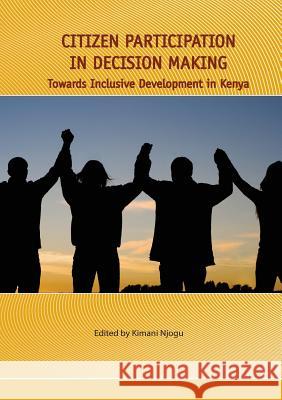Citizen Participation in Decision Making. Towards Inclusive Development in Kenya » książka
Citizen Participation in Decision Making. Towards Inclusive Development in Kenya
ISBN-13: 9789966028433 / Angielski / Miękka / 2013 / 250 str.
This book is a result of public dialogue forums in pursuit of accountable and transparent governance in Kenya organized by Twaweza Communications with the support of Ford Foundation. From the convenings it was evident that the stability of Kenya will be driven by the extent to which citizens feel fully included in the development agenda. Quite often, political leaders view the role of citizens in governance as restricted primarily to their participation in the electoral process. This narrow view has led to arrogance and total disregard of citizens after poll results are announced. Under the new political dispensation heralded by the promulgation of the Constitution of Kenya on August 27, 2010 this trend must change and the sovereignty of the people, in theory and practice, must be reinscribed. The publication raises important issues worth serious reflection. It also suggests ways in which citizens can better participate in their own transformation. Case studies highlighted in the book exemplify the importance building the Kenyan nation by addressing patterns of exclusion and glaring inequalities. The topics covered include multipartism, natural resource governance, gender, politics of identity, marginalization of Coastal Kenya, youth empowerment and investing in knowledge economy among others. The book is a valuable addition to our understanding of the root political and social anxieties in Kenya and how these could be ameliorated.
This book is a result of public dialogue forums in pursuit of accountable and transparent governance in Kenya organized by Twaweza Communications with the support of Ford Foundation. From the convenings it was evident that the stability of Kenya will be driven by the extent to which citizens feel fully included in the development agenda. Quite often, political leaders view the role of citizens in governance as restricted primarily to their participation in the electoral process. This narrow view has led to arrogance and total disregard of citizens after poll results are announced. Under the new political dispensation heralded by the promulgation of the Constitution of Kenya on August 27, 2010 this trend must change and the sovereignty of the people, in theory and practice, must be reinscribed. The publication raises important issues worth serious reflection. It also suggests ways in which citizens can better participate in their own transformation. Case studies highlighted in the book exemplify the importance building the Kenyan nation by addressing patterns of exclusion and glaring inequalities. The topics covered include multipartism, natural resource governance, gender, politics of identity, marginalization of Coastal Kenya, youth empowerment and investing in knowledge economy among others. The book is a valuable addition to our understanding of the root political and social anxieties in Kenya and how these could be ameliorated.











